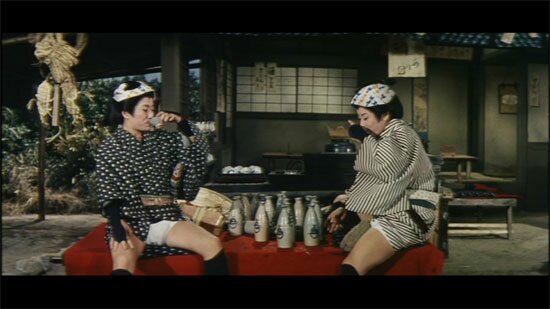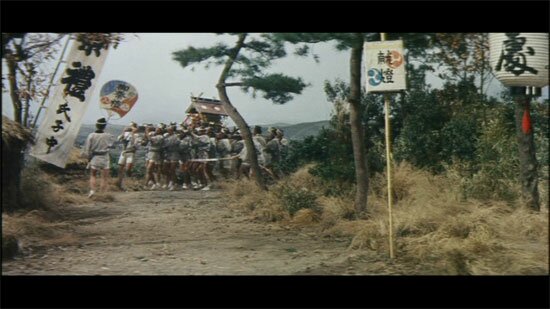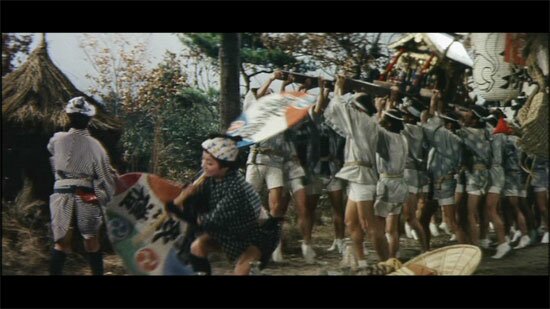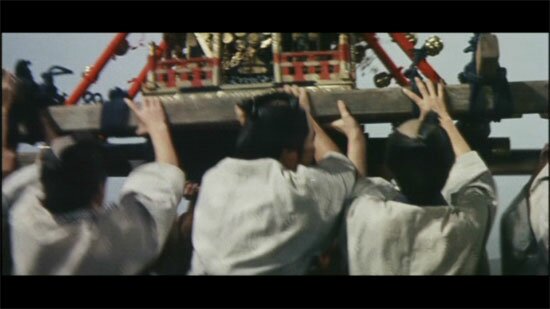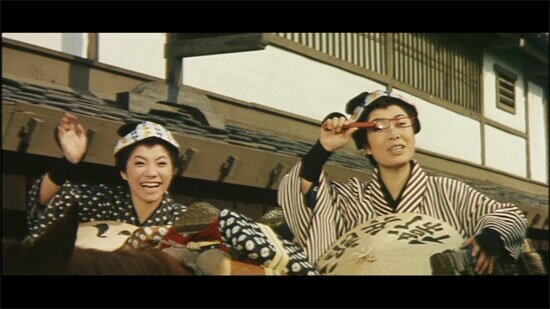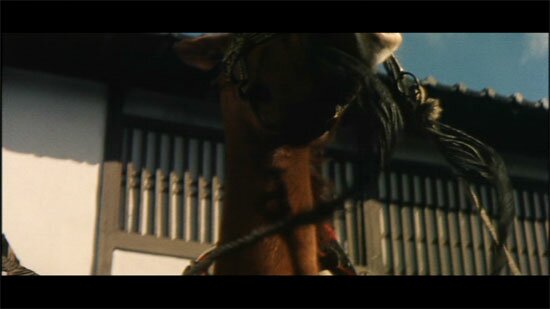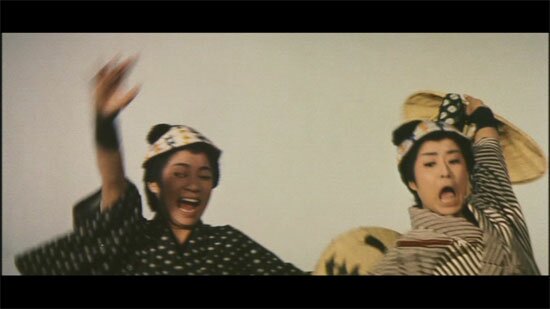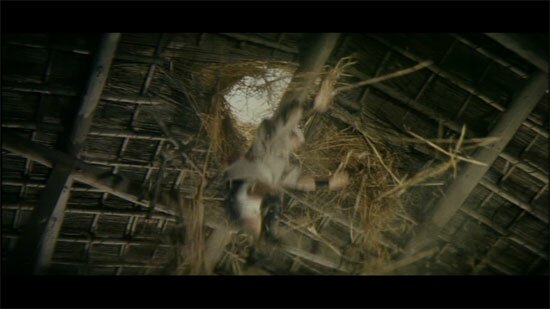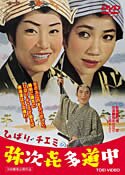 Hibari Chiemi no Yaji Kita Dochu (1962) Toei DSTD02373 Synopsis This is a tale of two friends. One is very near-sighted (Hibari Misora) and the other one is just plain crazy (Chiemi Eri). They currently work at a local theater in Edo hanging up the shoes of the patrons. They hope they will one day get a chance to perform on the theater's stage in front of an audience. 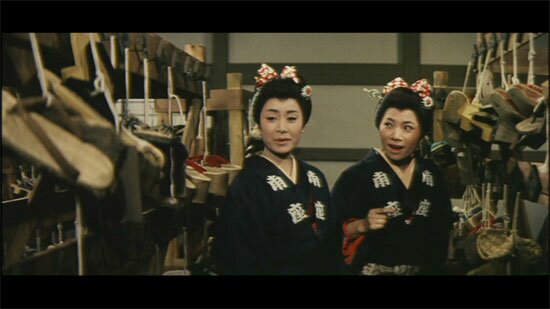 Hibari and Chiemi hanging up shoes. One night, after everyone has gone home, they practice their singing and dancing on the theater's stage. Unfortunately, they accidentally fall through a hole in the stage and crash down into the basement of the theater. In the basement they discover a local drug gang and a beggar priest (Chiyonosuke Azuma) holding a meeting. The ladies are offended that these criminals are conducting their drug business in their sacred theater. The ladies threaten to report them to the police and the criminals respond by attacking them. This sets off a huge brawl in the theater that soon involves the police. Eventually the police are able to get control of the situation and the gang members, the beggar priest, and the two ladies are thrown in jail. The ladies claim they are innocent and demand that they be released from jail. The police refuse. 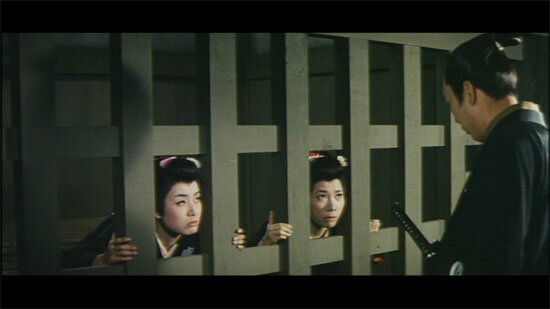 The ladies in the slammer. While interrogating the beggar priest, the police discover that he is actually an undercover police officer who is attempting to infiltrate the drug gang to find out who the leader is. To help him in his mission, the undercover police officer asks them to allow him and one of the higher-ranking gang members to break out of jail. The police agree. The police finally agree to release the ladies from jail but the ladies have now changed their mind and they don't want to leave. They now have a few demands that have to be met before they agree to leave the jail. They want a written commendation from the magistrate and a monetary reward for their help in apprehending the members of the drug gang. The police chief scoffs at their demands and has his men pick them up and dump them outside the jail. As soon as they are released, they quickly run back into the jail and lock themselves in their old jail cell. The police chief decides he has had enough of the two and finally gives in to their demands. With the written commendation and monetary reward in hand, they go back to the theater and show them to their boss (Shunji Sakai). They hope he will be so impressed that he will give them a better job at the theater. Their hopes are dashed when the boss tells them they are fired. They have caused enough problems and he doesn't want his theater dragged into the mess with the local drug gang. He gives them some traveling money and sends them on their way. 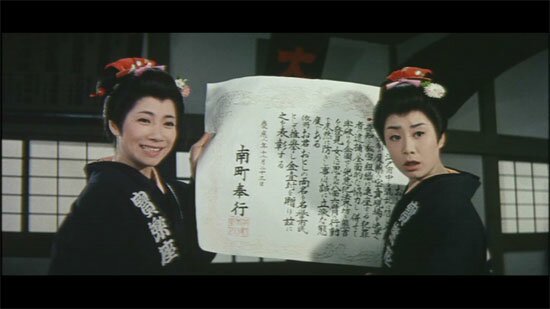 The ladies showing the written commendation to their boss. The two leave Edo and began traveling around Japan dressed as men. Meanwhile, the undercover police officer is getting closer to finding out who the leader of the drug gang is... 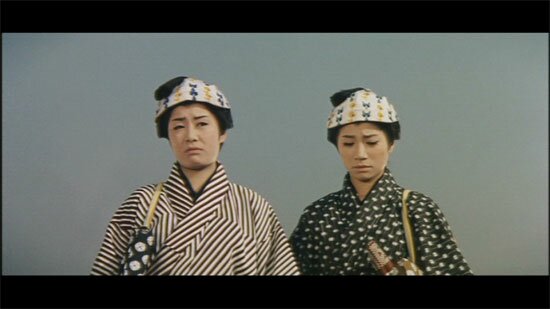 The ladies (dressed as men) begin their journey. Review Hibari Chiemi no Yaji Kita Dochu is best described as a super silly live-action cartoon. Two of Japan's greatest songbird's, Hibari Misora and Chiemi Eri, come together to deliver a non-stop barrage of gags and songs. Hibari and Chiemi give extremely energetic performances and act like mischievous 12 years olds for the entire duration of the film. The chemistry between the two is great and they compliment each other nicely. Having Hibari and Chiemi in the same film is like having your cake and eating it too. If the film has a fault, it is that the identity of the drug lord is a little too easy to guess. By the time it is revealed at the end of the film, it isn't much of a surprise to the viewer. Although Hibari and Chiemi appeared together in films before and after this, I think this is easily the best film collaboration between the two. They sing and dance their hearts out and leave the audience with an ending that is guaranteed to leave a smile on the face of the viewer. Toei jidaigeki star Chiyonosuke Azuma plays the undercover police officer. In Hibari's films, Chiyonosuke excelled at playing characters who were skilled with a sword but were a little looney. Comedian Shunji Sakai, a constant fixture in Hibari's films, plays the theater owner. He is the father of Masaaki Sakai. Last summer, Toei asked fans which Hibari films they wanted to be released on DVD. This film came in tenth place (the highest ranking for any of the Hibari/Chiemi collaborations). http://www.toei-video.co.jp/DVD/sp21/hibaridvd.html#report Film Highlights:
CAST Hibari Misora Japan's greatest singer, and, arguably, greatest entertainer. She made her singing debut at the age of nine and made her film debut a few years later. She had an extensive film career (around 165 films). She married and later divorced Nikkatsu superstar Akira Kobayashi. She died at the age of 52 in 1989. Official Hibari Misora Website (Japanese/English) http://www.misorahibari.com/ Official Hibari Misora Memorial Hall Website (Japanese) http://www.misora-hibari.com/ Unofficial Website (Japanese) http://homepage2.nifty.com/misorahibarikansaifk/index.html Biography (English) http://www.kyoto-su.ac.jp/information/famous/misorah.html Chiemi Eri She made her singing debut at the age of fourteen with the single Tennessee Waltz which became a big hit. Her rendition was excellent and it is hard to believe that the song was being sung by a 14 year old. Chiemi would also embark on a film career like Hibari. In 1959, Chiemi married Ken Takakura but they got divorced in 1971. Before Ken Takakura became Toei's yakuza workhorse, he was often the love interest in Hibari's films set during contemporary times. 
Chiemi died at the age of 45 in 1982. If you've seen the semi-recent Poppoya (Railroad Man) starring Ken, you know the wife of his character hums Tennessee Waltz throughout the film. If you are familiar with Ken's personal life, the act by the wife of his character has added significance because Ken's real ex-wife (Chiemi) is the one who made the song popular in Japan. The two main Chiemi Eri websites with extensive discographies, filmographies, etc: http://www.geocities.jp/chiemi_eri/ http://www.geocities.jp/eri_chiemisan/TOP.htm (includes my favorite picture of Chiemi) Sannin Musume Any discussion of Hibari and Chiemi would be incomplete if Sannin Musume were not mentioned. Sannin Musume were a trio consisting of three very popular eighteen year old singers (Hibari, Chiemi, and Izumi Yukimura). They made four films for Toho that were very popular. Of the three, only Izumi is still alive. Here are a few screenshots from the first Sannin Musume film, Hibari Chiemi Izumi no Janken Musume. It was Toho's fifth color film and Toho's highest grossing film of 1955 (3rd overall among local films).  Hibari, Izumi, Chiemi 
DVD
Toei have put a little bit of extra effort into the Hibari DVD releases. The scene selection menus actually have thumbnail images (Toei usually includes only text descriptions of the scenes), Toei have doubled the amount the stills in the photo gallery (Toei usually only includes around 10 stills in their photo galleries), and the original poster art has been included on the DVD (similar to what Celestial/IVL do on the Shaw Brothers DVDs). The original poster art is also used for the DVD cover but it's still a nice touch to include the unmodified poster art as an extra because Toei has to slightly modify the original poster art to make it suitable for a DVD cover. Transfer Notes:
Related Links http://www.toei-video.co.jp/DVD/sp21/hibaridvd.html Toei's website for their Hibari DVD campaign (in Japanese). The B&W picture at the top of the page (Hibari smiling with one eye closed) is from Hibari Chiemi no Yaji Kita Dochu. This promotional photo is included in the photo gallery on this DVD. http://www.toei-video.co.jp/DVD/sp21/hibari02373.html Toei's website for the Hibari Chiemi no Yaji Kita Dochu DVD (in Japanese) http://www.cdjapan.co.jp/detailview.html?KEY=KICS-6239 http://www.co-cfc.co.jp/detail.msp?id=1304 This box set released last year by King Records collects Chiemi's singles beginning with her 1952 debut single Tennessee Waltz which made her a star in Japan. Also includes a rare Los Angeles concert from 1980 (two years before her death). http://www.co-cfc.co.jp/d2665main.msp http://columbia.jp/sanninmusume/ This box set released last year by Columbia collects the soundtracks to the four Sannin Musume films. The set also includes songs recorded for the films but not used. The box set is only available directly from Columbia (not available in stores). http://www.toho-a-park.com/video/new/hibari/d-index01.html http://www.toho-a-park.com/video/new/hibari/d-index04.html http://www.toho-a-park.com/video/new/hibari/d-index06.html http://www.toho-a-park.com/video/new/hibari/d-index08.html All four Sannin Musume films were released on DVD last March (along with the six other Hibari films Toho owns). It would be nice if Toho would release the other films Chiemi did for them (especially the Sazae-san series) but it isn't very likely.  Gakken Graphic Books Deluxe #35: Toei Jidaigeki Films http://bookweb2.origin.kinokuniya.co.jp/htm/4054022235.html Japanese Text/No English Around 120 pages A cheaper alternative to the poster books released by Wides Shuppan, Gakken Graphic Books Deluxe #35: Toei Jidaigeki Films is a nice little introduction to Toei's extremely popular and very profitable jidaigeki films. This softback book from publisher Gakken is divided up into several sections: The first section is devoted to film posters organized by actor. Toei's top jidaigeki actors get their own section (Chiezo Kataoka, Utaemon Ichikawa, Ryutaro Otomo, Hibari, Kinnosuke Nakamura, and Chiyonosuke Azuma) while the less popular actors (Ryunosuke Tsukigata, Kanjuro Arashi, Jushiro Konoe, Sentaro Fushimi, Kotaro Satomi, and Hiroki Matsukata) get lumped together in the final section. The posters are either given a full page or are put four to a page. Only the posters for the "big" films are given a full page. Using the films of Hibari as an example, the poster for Hanagasa Wakashuu gets a full page while the poster for Hibari Chiemi no Yaji Kita Dochu doesn't get a full page. The second section is devoted to biographies of Toei's jidaigeki actors. The top jidaigeki actors get a full page write up (Chiezo Kataoka, Hibari, Kinnosuke Nakamura, Chiyonosuke Azuma, Hashizo Okawa, Ryutaro Otomo, Kotaro Satomi, Ryunosuke Tsukigata, and Hiroki Matsukata) while the less popular actors just get a few lines. The third section consists of brief information on many of Toei's jidaigeki films (cast/crew, synopsis, VHS cover art, and one still for each film). muldoon |
| Menus |
 |
| Scene Selection |
 |
 |
 |
| Photo Gallery |
 |
| Original Poster Art |
 |
| Screenshots |
 |
 |
 |
 |
 |
 |
 |
 |
 |
 |
 |
 |
 |
 |
 |
 |
 |
 |
 |
 |
 |
 |
 |
 |
 |
 |
 |
 |
 |
| The great ending... |
 |
 |
 |
 |
 |
 |
 |
